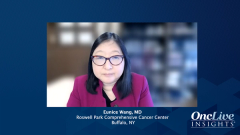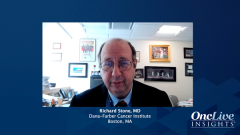
Considerations for Venetoclax + Azacitidine Administration and AE Management
Richard Stone, MD, and Eunice Wang, MD, discuss considerations and challenges related to the administration of venetoclax and azacitidine in the community setting, and share strategies for managing adverse events associated with this combination.
Episodes in this series

Richard Stone, MD: Dr Wang, I wanted to ask you about the use of venetoclax with azacitidine in the community, because this is a regimen being used exclusively in patients over 75 years of age. As we discussed, many patients under the age of 75 are getting it for various reasons. Is this like giving azacitidine? Or is it different?
Eunice Wang, MD: We found it to be significantly different. The fallacy is that giving venetoclax-azacitidine for physicians who have given venetoclax for CLL [chronic lymphocytic leukemia] or azacitidine for MDS [myelodysplastic syndromes] is just like putting them together and the toxicities aren’t increased. We don’t think that’s true. Even if you’ve done that for your other patients, the venetoclax-azacitidine regimen is unique. At our center, we have found that there’s an increased risk of tumor lysis [syndrome] for the first week of therapy, so patients need to be gradually dose-escalated during that time frame and to have daily or every-other-day monitoring to make sure they aren’t developing tumor lysis. That monitoring would include allopurinol and IV [intravenous] fluids, and checking their renal function and uric acid levels.
We’ve also found that when we start venetoclax and azacitidine, because of the need for the daily shots and dose escalation and the daily laboratory [tests], and given the logistical challenges that some of my older patients face, it’s easier for our center to admit patients for that first cycle of chemotherapy. We bring them in. That way, we’re able to do daily laboratory tests, daily transfusions, etc. The venetoclax-azacitidine regimen is associated with a significant amount of myelosuppression over the first week or two, so many of the patients stay in the hospital past that 1-week period for daily transfusions, red blood cells, CBCs [complete blood counts], etc.
I do know of colleagues and other people in the community who try to do the regimen as an outpatient, but I’d caution you that you need to have the ability to measure that lab work, particularly during that first week of therapy, on a daily basis, and to intervene as necessary with blood products and allopurinol, even rasburicase. We have adopted this approach. Other centers have adopted a very close monitoring of patients. They see them 2 to 4 times a week. It’s based a little on the practice and what people are familiar with. We do a bone marrow [test] on day 21 to day 28, and if patients are doing well, we stop the venetoclax if they have less than 5% blasts. We often administer growth factor to shorten the time of neutropenia, which can be associated with significant infectious risk in older patients. Rich, do you do anything differently at your center?
Richard Stone, MD: I totally agree. We don’t admit them during the first cycle only if they live literally down the street and are very interested in not coming into the hospital. Otherwise, they come in for the first cycle. Many of our older patients want to come in for subsequent cycles because the drive into Boston every day from the suburbs or [elsewhere] can be a major toxicity for them.
Eunice Wang, MD: Exactly.
Richard Stone, MD: I totally agree with the bone marrow [monitoring] during the first cycle. That’s very important. People forget that. It’s also very important to monitor these patients. You can’t just give [the treatment] and forget about them. Maybe you can a little when they’re doing well after a few cycles and get less frequent CBCs. But you should follow them at least once a week, if not twice a week, during the first couple of cycles. I agree with that.
Transcript edited for clarity.






































